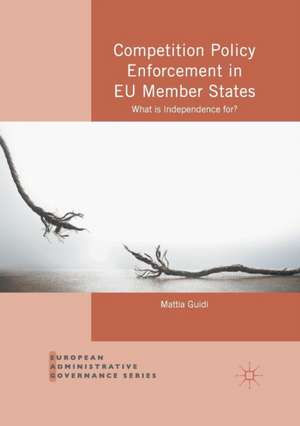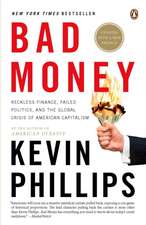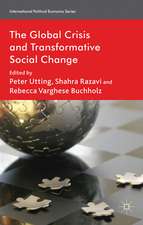Competition Policy Enforcement in EU Member States: What is Independence for?
Autor Mattia Guidien Limba Engleză Paperback – 27 mar 2019
| Toate formatele și edițiile | Preț | Express |
|---|---|---|
| Paperback (1) | 521.42 lei 6-8 săpt. | |
| Palgrave Macmillan UK – 27 mar 2019 | 521.42 lei 6-8 săpt. | |
| Hardback (1) | 695.34 lei 6-8 săpt. | |
| Palgrave Macmillan UK – 20 oct 2016 | 695.34 lei 6-8 săpt. |
Preț: 521.42 lei
Preț vechi: 613.43 lei
-15% Nou
Puncte Express: 782
Preț estimativ în valută:
99.79€ • 102.19$ • 83.01£
99.79€ • 102.19$ • 83.01£
Carte tipărită la comandă
Livrare economică 18 martie-01 aprilie
Preluare comenzi: 021 569.72.76
Specificații
ISBN-13: 9781349933921
ISBN-10: 1349933929
Pagini: 186
Ilustrații: XV, 186 p. 7 illus.
Dimensiuni: 148 x 210 mm
Greutate: 0.25 kg
Ediția:1st ed. 2016
Editura: Palgrave Macmillan UK
Colecția Palgrave Macmillan
Locul publicării:London, United Kingdom
ISBN-10: 1349933929
Pagini: 186
Ilustrații: XV, 186 p. 7 illus.
Dimensiuni: 148 x 210 mm
Greutate: 0.25 kg
Ediția:1st ed. 2016
Editura: Palgrave Macmillan UK
Colecția Palgrave Macmillan
Locul publicării:London, United Kingdom
Cuprins
List of Figures.- List of Tables.- Preface.- 1. Introduction.- 2. EU Competition Policy in Context.- 3. Independence: Reasons, Costs and Benefits.- 4. Explaining National Competition Authorities' Indepdence.- What is Independence For? Measuring the Impact of Independence in Competition Policy Enforcement?.- 6. Conclusions.- Appendices.- Index.
Notă biografică
Mattia Guidi is Post-Doctoral Fellow at LUISS Guido Carli in Rome, Italy, where he teaches International Public Policies. He holds a PhD in Political and Social Sciences from the European University Institute. His research focuses on delegation and institutions, including independent regulatory agencies, EU competition policy and EU public policies in general.
Textul de pe ultima copertă
This book investigates the crucial EU policy of competition, which is enforced by the Commission and by national agencies that enjoy various degrees of autonomy from their governments. More and more policy-making activities are nowadays delegated to agencies that cannot be held accountable to parliaments, and ultimately to voters. The author explains why this is the case in the field of EU competition policy and discusses whether independence is linked to improved enforcement – as theories of delegation and common wisdom would suggest. These questions are explored with an in-depth analysis covering 27 EU countries for 17 years (1993–2009). While the results show that independence is given when countries lack credibility and good reputation, they also point out that autonomy from governments can hardly be associated with improved regulatory output. So, is independence of competition authorities useful to society in the end? This book will appeal to upper-level students and scholars interested in competition policy, regulatory agencies, and European public policy.
Caracteristici
Empirically assesses the performance of competition policy enforcement agencies to consider their worth Argues that independence in competition enforcement does not have a significant impact on the agencies’ regulatory outcome and reputation Bridges together the historical analysis of EU competition policy and its most recent developments with relevant economic and political literature














